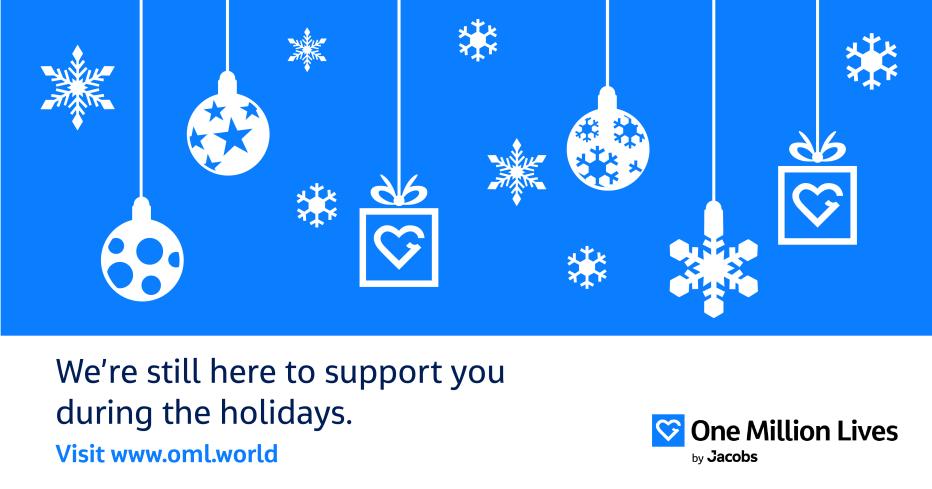
In case you missed it, Jacobs, in collaboration with global mental health professionals, recently launched One Million Lives, a free mental health check-in tool to enhance users' understanding of their current state of mind and provide proactive strategies for personal mental health development.
By regularly completing a check-in, via the web-based app, users will ideally be better equipped to understand how they are currently coping, assess the early indicators of associated mental health challenges, start positive and active conversations and get support much earlier.
The holidays can be a tough time for many. With the festive season approaching, please remember to switch off, practice self-care, be kind to one another and prioritize your own mental health with these ten top tips.
- Give yourself permission to have a less than-perfect holiday. There is a lot of pressure to have picture-perfect festivities, and we feel let down when our plans don’t go the way we intended. Don’t compare your celebrations to the ones you see on social media. Instead, reflect on what you are most looking forward to during the holiday season and focus your energy there.
- Manage family gatherings. Holiday celebrations can be stressful when there is tension and unresolved disagreements between family. Remember that most people are also under stress and that having a little empathy and understanding can go a long way. Avoid known trigger topics and think in advance about how to end difficult conversations. It’s ok to tell someone you don’t want to talk about something, change the subject, or step out of a stressful situation.
- Set a budget – and stick to it. Many people feel financially stretched buying presents and other holiday related expenses. Set a realistic budget for gifts, food and events and don’t let yourself exceed it. If you feel overwhelmed by the number of people to buy for, suggest doing a Secret Santa gift exchange instead.
- Manage your social calendar. As the end of the year approaches, many of us feel tired and burnt out. Often, we agree to attend events out of obligation, guilt or tradition. This year, set manageable boundaries with friends and family for what events you attend, how long you stay and the activities you take part in. It’s ok to take time for yourself to rest and recharge.
- Eat, drink and be merry – in moderation. Eating and drinking too much has become a norm during the holidays, but usually leaves us feeling worse off the next day. Try to enjoy things in moderation, and always adhere to the recommended drinking guidelines. However, if you do find that you’ve overindulged, don’t beat yourself up – balance nights out and heavy meals with lighter days to give your body a break.
- Maintain your routine. The busy holiday season often means our regular sleep and exercise routine is disrupted. This can impact our body’s natural patterns and have a negative effect on our mood and sense of well-being. Try to keep your sleep and exercise as consistent as possible to support your mental health and resilience.
- Use your social network. Being able to call on support is a large factor for coping with stress. You do not need to “do it all yourself” this holiday. Even if you can’t solve the problem by talking about it, naming what is bothering you changes brain activity for the better.
- Managing loneliness. This time of year can amplify feelings of isolation and loneliness. If you are spending the holidays alone, make a plan in advance to do things you enjoy – for example, make yourself a special meal or buy yourself a gift to enjoy on the day. Find out what events are happening in your local community, such as carols, a church service, or markets, and get involved.
- Rest, reflect and plan. Many people take the opportunity at the end of the year to look back on what went well and what didn’t and plan for the year ahead. 2020 has been a difficult year and many will be glad to leave it behind, but don’t forget to reflect on and celebrate your achievements – however small they may seem. For those who make New Year’s resolutions, try to make goals that are positive and achievable. Focus on things that make you feel positive, healthy and fulfilled, and allow you to maintain balance in your life.
- Reach out for help. If holiday season stress is getting too much for you and you need support, visit https://www.oml.world/needhelpnow to find services in your location. All services are confidential, free to use and available 24/7.
The free, One Million Lives mental health check-in tool is available for download at: app.oml.world (best used with Chrome) and is supported by www.oml.world, which provides mental health and campaign resources including the One Million Lives video, conversation starters and useful resources for more information.
One Million Lives is not intended to diagnose, treat, cure or prevent any mental health disease or condition. Please seek immediate help from trained medical physicians if you suspect you are suffering from any mental health or other medical condition.














































